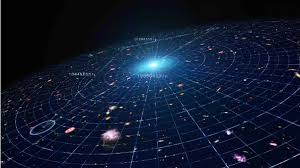The official discord link if you wish to join the discord: https://discord.gg/j5RKwCvAFu
Support the wiki on our official Ko-Fi page or Patreon page!
Universe: Difference between revisions
PlozBot (talk | contribs) (→Big Rip: clean up, replaced: {{Discussions}} → Category:Rid, Category:Revisions → {{Discussions}}) m |
m |
||
| Line 38: | Line 38: | ||
[[Category:Important]] | [[Category:Important]] | ||
[[Category:Terms]] | [[Category:Terms]] | ||
{{Discussions}} | {{Discussions}} | ||
Revision as of 02:59, 18 February 2021

The Universe is all of space and time and their contents, including planets, stars, galaxies, all forms of matter and energy. Due to the unknown spatial size of the universe (as it is ever expanding), we use the size of the observable universe as a baseline for universal feats. The observable universe is currently estimated to be 93 billion light-years in diameter. In certain cosmologies, there can be many universes casually disconnected to form a greater whole called a multiverse, which similarly comprises all of space and time and its contents; though it should be noted universe can have two meanings. One is the single space-time continuum apart of a larger multiverse, the other is the totality of a cosmology. The term "verse" is used to simply say "the universe of a fictional series", for example the "Zelda verse" is referring to the "Universe of the Legend of Zelda" series.
Universe-sized Realms Guidelines
It is common for fictional characters to be scaled based on creating one or multiple "Worlds", "Dimensions", or "Realms". However, many users may often be confused on whether those are synonyms of universes or simply pocket realities. They may have indications of being quite large, the normal requirements for these to be a universe are the following (do note that a single one of these requirements works):
- These are notes that the worlds are indeed universes; while they don't need all of these, at least one of them should indicate this.
- If they are outright called universes or stated to be the size of universes by a reliable source, they should be considered universes.
- If they're called an alternate dimension, world, or realm in relation to the current setting the character's in with no contradictions and is not stated or shown to be a pocket realm/pocket reality.
- If they are outright stated to be completely separated by the barriers of time and space or either stated or shown to be reasonable in size, such as having countless galaxies, then they should indeed be universes.
- If they're flat out stated to be entire timelines, then they are indeed alternate universes.
- Being labeled as an "Alternate Realities" indicates them being alternate universes.
- If they're stated to mirror "The Universe" or "Our Universe" or "The Real World", they would refer to being universes.
- Being called an alternate world with a starry sky may qualify as being a universe, however if it is a pocket dimension then it will be considered a Multi-Solar System sized pocket reality.
- Having multiple galaxies within it should qualify.
- The following cannot be used to prove an alternate realm is a universe:
- A realm having time that works somewhat differently is not enough to be considered a Universe as nonlinear time within a single universe exists.
- The Worlds being different bodies of space is not enough to consider them universes, as that does not quite prove they have different timelines. Especially if they are afterlives. Afterlives often are different bodies of space, but are generally condensed in the same timeline unless there's more proof otherwise.
- Unreliable sources calling something an alternate reality.
Note: The reason we allow the term "parallel worlds" to be considered alternate universe is that it is a noticeable constant in fiction to define an alternate universe (also in real life) and to expect an author that has already predefined an area as a "parallel world" to come in later an call it a universe is very unreasonable. If there are no contradictions into the case, then a parallel world not established as a pocket reality or a pocket dimension can be considered a universe.
Note 2: It should also be self-evident that context matters greatly, a person could indeed be calling something an alternate universe but in their cosmology universes are incredibly small. Obviously this isn't the regular case or assumed case but it can exist, so be sure to look out for this.
Big Bang/Big Crunch/Big Rip
Big Bang
Big Crunch
Arguably, surviving a Big Crunch is a better durability feat than surviving a Big Bang. The latter involves energy spreading in all directions, so you'll only catch some of it. However, the former has all of the energy directly concentrated onto you in one point as a singularity.
Big Rip
Discussions (Link For Mobile Users):
| Discussion threads involving Universe |
